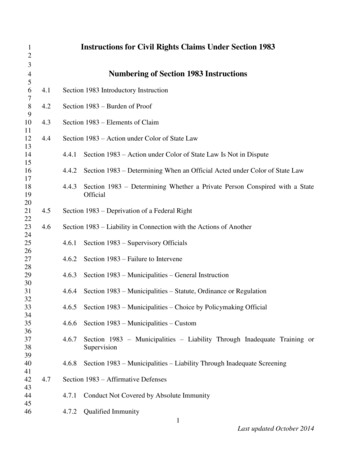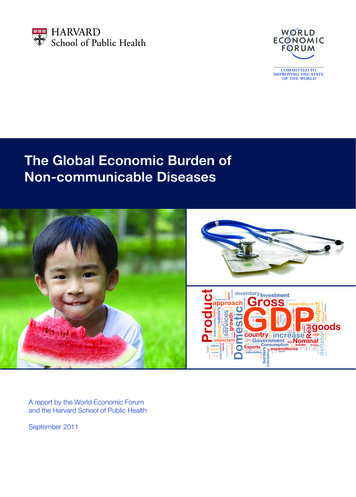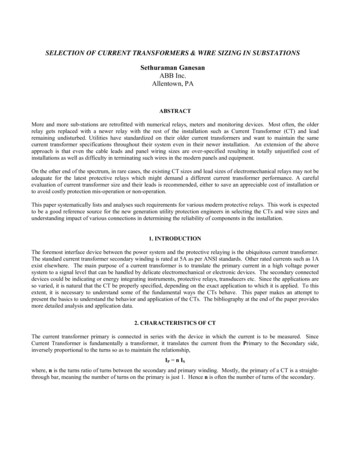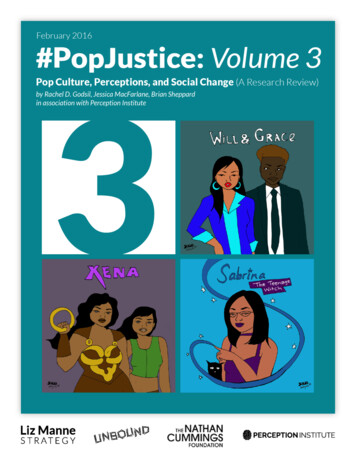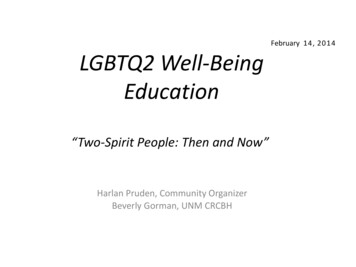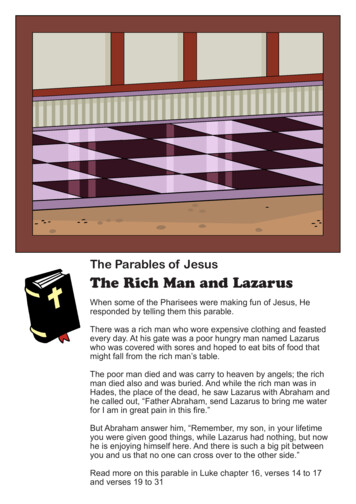
Transcription
The WHITE MAN’S BURDEN
Also by William EasterlyThe Elusive Quest for Growth: Economists’ Adventuresand Misadventures in the Tropics
TheWHITE MAN’S BURDENWHY THE WEST’SEFFORTS TO AID THE RESTHAVE DONE SO MUCH ILLAND SO LITTLE GOOD
WILLIAM EASTERLYTHE PENGUIN PRESSNEW YORK2006
THE PENGUIN PRESSPublished by the Penguin GroupPenguin Group (USA) Inc., 375 Hudson Street, New York, New York 10014, U.S.A. Penguin Group (Canada), 90 Eglinton Avenue East, Suite 700, Toronto, Ontario, Canada M4P 2Y3(a division of Pearson Penguin Canada Inc.) Penguin Books Ltd, 80 Strand, London WC2R 0RL,England Penguin Ireland, 25 St. Stephen’s Green, Dublin 2, Ireland (a division of Penguin BooksLtd) Penguin Books Australia Ltd, 250 Camberwell Road, Camberwell, Victoria 3124, Australia (adivision ofPearson Australia Group Pty Ltd) Penguin Books India Pvt Ltd, 11 Community Centre, PanchsheelPark,New Delhi–110 017, India Penguin Group (NZ), Cnr Airborne and Rosedale Roads, Albany,Auckland1310, New Zealand (a division of Pearson New Zealand Ltd) Penguin Books (South Africa) (Pty)Ltd,24 Sturdee Avenue, Rosebank, Johannesburg 2196, South AfricaPenguin Books Ltd, Registered Offices:80 Strand, London WC2R 0RL, EnglandFirst published in 2006 by The Penguin Press,a member of Penguin Group (USA) Inc.Copyright William Easterly, 2006All rights reservedLIBRARY OF CONGRESS CATALOGING-IN-PUBLICATION DATAEasterly, William Russell.The white man’s burden: why the West’s efforts to aid the rest have done so much ill andso little good / William Easterly.p. cm.Includes bibliographical references and index.ISBN: 978-1-1012-1812-91. Economic assistance—Developing countries. 2. Poverty—Prevention. I. Title.HC59.7.E22 2006338.91'1713—dc222005055516Designed by Stephanie HuntworkWithout limiting the rights under copyright reserved above, no part of this publication may bereproduced, stored in or introduced into a retrieval system, or transmitted, in any form or by anymeans (electronic, mechanical, photocopying, recording, or otherwise), without the prior writtenpermission of both the copyright owner and the above publisher of this book.The scanning, uploading, and distribution of this book via the Internet or via any other means without
the permission of the publisher is illegal and punishable by law. Please purchase only authorizedelectronic editions, and do not participate in or encourage piracy of copyrightable materials. Yoursupport of the author’s rights is appreciated.
F OR RACHEL, CALEB, AND GRACE, AS ALWAYSTO LIZZIE, WITH LOVE AND RESPECT
CONTENTSCHAPTER ONEPlanners Versus SearchersPART IWHY PLANNERS CANNOT BRING PROSPERITYCHAPTER TWOThe Legend of the Big PushCHAPTER THREEYou Can’t Plan a MarketCHAPTER FOURPlanners and GangstersPART IIACTING OUT THE BURDENCHAPTER FIVEThe Rich Have Markets, the Poor Have BureaucratsCHAPTER SIXBailing Out the PoorCHAPTER SEVENThe Healers: Triumph and Tragedy
PART IIITHE WHITE MAN’S ARMYCHAPTER EIGHTFrom Colonialism to Postmodern ImperialismCHAPTER NINEInvading the PoorPART IVTHE FUTURECHAPTER TENHomegrown DevelopmentCHAPTER ELEVENThe Future of Western AssistanceACKNOWLEDGMENTSNOTESINDEX
TheWHITE MAN’S BURDEN
SNAPSHOT: AMARETCHIAM DRIVING OUT OFAddis Ababa, Ethiopia, to the countryside. An endless line of womenand girls is marching in the opposite direction, into the city. They range in age from nine to fiftynine. Each one is bent nearly double under a load of firewood. The heavy loads propel themforward almost at a trot. I think of slaves driven along by an invisible slave driver. They arecarrying the firewood from miles outside of Addis Ababa, where there are eucalyptus forests,and across the denuded lands encircling the city. The women bring the wood to the main citymarket, where they will sell it for a couple of dollars. That will be it for their day’s income, asit takes all day for them to heft firewood into Addis and to walk back.I later found that BBC News had posted a story about one of the firewood collectors.Amaretch, age ten, woke up at 3:00 A.M. to collect eucalyptus branches and leaves, then beganthe long and painful march into the city. Amaretch, whose name means “beautiful one,” is theyoungest of four children in her family. She says: “I don’t want to have to carry wood all my life.But at the moment I have no choice because we are so poor. All of us children carry wood tohelp our mother and father buy food for us. I would prefer to be able to just go to school and nothave to worry about getting money.1When another group of Western television cameramen encountered the depths of poverty inEthiopia for the first time, they went back to their hotel rooms and cried their eyes out.2 That isthe right response. What can be more important? I dedicate this book to Amaretch, and to themillions of children like her around the world.
CHAPTER ONE
PLANNERS VERSUS SEARCHERSTake up the White Man’s burden—In patience to abide,To veil the threat of terrorAnd check the show of pride;By open speech and simple,An hundred times made plain,To seek another’s profitAnd work another’s gain.Take up the White Man’s burden—The savage wars of peace—Fill full the mouth of Famine,And bid the sickness cease.RUDYARD KIPLING,“THE WHITE MAN’S BURDEN,” 1899U NITED KINGDOM CHANCELLOR of the Exchequer Gordon Brown is eloquent about one ofthe two tragedies of the world’s poor. In January 2005, he gave a compassionate speech about thetragedy of extreme poverty afflicting billions of people, with millions of children dying from easilypreventable diseases. He called for a doubling of foreign aid, a Marshall Plan for the world’s poor,and an International Financing Facility (IFF) against which tens of billions more dollars toward futureaid could be borrowed to rescue the poor today. He offered hope by pointing out how easy it is to dogood. Medicine that would prevent half of all malaria deaths costs only twelve cents a dose. A bednet to prevent a child from getting malaria costs only four dollars. Preventing five million childdeaths over the next ten years would cost just three dollars for each new mother. An aid program togive cash to families who put their children in school, getting children like Amaretch into elementaryschool, would cost little.3Gordon Brown was silent about the other tragedy of the world’s poor. This is the tragedy in
which the West spent 2.3 trillion on foreign aid over the last five decades and still had not managedto get twelve-cent medicines to children to prevent half of all malaria deaths. The West spent 2.3trillion and still had not managed to get four-dollar bed nets to poor families. The West spent 2.3trillion and still had not managed to get three dollars to each new mother to prevent five million childdeaths. The West spent 2.3 trillion, and Amaretch is still carrying firewood and not going to school.It’s a tragedy that so much well-meaning compassion did not bring these results for needy people.In a single day, on July 16, 2005, the American and British economies delivered nine millioncopies of the sixth volume of the Harry Potter children’s book series to eager fans. Book retailerscontinually restocked the shelves as customers snatched up the book. Amazon and Barnes & Nobleshipped preordered copies directly to customers’ homes. There was no Marshall Plan for HarryPotter, no International Financing Facility for books about underage wizards.4 It is heartbreaking thatglobal society has evolved a highly efficient way to get entertainment to rich adults and children,while it can’t get twelve-cent medicine to dying poor children.This book is about that second tragedy. Visionaries, celebrities, presidents, chancellors of theexchequer, bureaucracies, and even armies address the first tragedy, and their compassion and hardwork deserve admiration. Many fewer address the second tragedy. I feel like kind of a Scroogepointing out the second tragedy when there is so much goodwill and compassion among so manypeople to help the poor. I speak to many audiences of good-hearted believers in the power of BigWestern Plans to help the poor, and I would so much like to believe them myself. I often feel like asinful atheist who has somehow wound up in the meeting of the conclave of cardinals to choose thesuccessor to the saintly John Paul II. Where there is a lot of consensus for Big Plans to help the poor,the audience receives my doubts about these plans about as well as the cardinals would receive mynomination of the pop singer Madonna to be the next Pope.But I and many other like-minded people keep trying, not to abandon aid to the poor, but to makesure it reaches them. Rich countries have to address the second tragedy if they are going to make anyprogress on the first tragedy. Otherwise, the current wave of enthusiasm for addressing world povertywill repeat the cycle of its predecessors: idealism, high expectations, disappointing results, cynicalbacklash.The second tragedy is due to the mistaken approach that traditional Western assistance takestoward world poverty. So has this book finally found, after all these years, the right Big Plan toreform foreign aid, to enrich the poor, to feed the hungry, and to save the dying? What a breakthroughif I have found such a plan when so many other, much smarter, people than I have tried many differentplans over fifty years, and have failed.You can relax; your author has no such delusions of grandeur. All the hoopla about having theright plan is itself a symptom of the misdirected approach to foreign aid taken by so many in the pastand so many still today. The right plan is to have no plan.Planners’ Failure, Searchers’ SuccessLet’s call the advocates of the traditional approach the Planners, while we call the agents for changein the alternative approach the Searchers. The short answer on why dying poor children don’t gettwelve-cent medicines, while healthy rich children do get Harry Potter, is that twelve-cent medicinesare supplied by Planners while Harry Potter is supplied by Searchers.This is not to say that everything should be turned over to the free market that produced and
distributed Harry Potter. The poorest people in the world have no money to motivate marketSearchers to meet their desperate needs. However, the mentality of Searchers in markets is a guide toa constructive approach to foreign aid.In foreign aid, Planners announce good intentions but don’t motivate anyone to carry them out;Searchers find things that work and get some reward. Planners raise expectations but take noresponsibility for meeting them; Searchers accept responsibility for their actions. Planners determinewhat to supply; Searchers find out what is in demand. Planners apply global blueprints; Searchersadapt to local conditions. Planners at the top lack knowledge of the bottom; Searchers find out whatthe reality is at the bottom. Planners never hear whether the planned got what it needed; Searchersfind out if the customer is satisfied. Will Gordon Brown be held accountable if the new wave of aidstill does not get twelve-cent medicines to children with malaria?A Planner thinks he already knows the answers; he thinks of poverty as a technical engineeringproblem that his answers will solve. A Searcher admits he doesn’t know the answers in advance; hebelieves that poverty is a complicated tangle of political, social, historical, institutional, andtechnological factors. A Searcher hopes to find answers to individual problems only by trial anderror experimentation. A Planner believes outsiders know enough to impose solutions. A Searcherbelieves only insiders have enough knowledge to find solutions, and that most solutions must behomegrown.Columbia University professor and director of the United Nations Millennium Project JeffreySachs is an eloquent and compassionate man. I am always moved when I listen to him speak.Unfortunately, his intellectual solutions are less convincing. Professor Sachs offers a Big Plan to endworld poverty, with solutions ranging from nitrogen-fixing leguminous trees to replenish soil fertility,to antiretroviral therapy for AIDS, to specially programmed cell phones to provide real-time data tohealth planners, to rainwater harvesting, to battery-charging stations, to twelve-cent medicines forchildren with malaria—for a total of 449 interventions. Professor Sachs has played an important rolein calling upon the West to do more for the Rest, but the implementation strategy is less constructive.According to Professor Sachs and the Millennium Project, the UN secretary-general should run theplan, coordinating the actions of officials in six UN agencies, the UN country teams, the World Bank,the International Monetary Fund, and a couple of dozen rich-country aid agencies. This Plan is thelatest in a long string of Western plans to end poverty.So for the twelve-cent medicines, the Planners are distracted by simultaneously doing the other448 interventions; they don’t have enough local information to know how many children in eachlocale have malaria and how many doses of medicine are needed at each of the myriad health clinics;they don’t have agents motivated to get those doses there; the local health workers are poorly paidand poorly motivated; many different aid agencies are doing many different interventions on the healthsystem and on malaria; nobody knows who or what to blame if the twelve-cent medicines are out ofstock in the local health clinic and do not reach the dying children; and the local parents don’t evenhave a way of communicating to the Planners whether the medicines have reached them.Searchers have better incentives and better results. When a high willingness to pay for a thingcoincides with low costs for that thing, Searchers will find a way to get it to the customer.The market rewarded book retailers, wholesalers, and publishers who got Harry Potter to thosefanatically awaiting the latest installment on July 16,2005. Those retailers, wholesalers, andpublishers have a strong incentive to have Harry Potter always in stock. Myriad children’s bookauthors search for compelling characters and narratives that will attract readers and earn themincome. When J. K. Rowling, a Scottish single mother on welfare, hit upon the story of a teenage
wizard who triumphs over evil, she became one of the richest women in the world.Searchers could find ways to make a specific task—such as getting medicines to dying children—work if they could concentrate on that task instead of on Big Plans. They could test whether aspecific task had a high payoff for the poor, get rewarded for achieving high payoffs, and beaccountable for failure if the task didn’t work. We will see some areas where Searchers have alreadyachieved tangible benefits, but they have had little chance to deliver in the area of global povertybecause foreign aid has been dominated by the Planners.The Planners have the rhetorical advantage of promising great things: the end of poverty. Theonly thing the Planners have against them is that they gave us the second tragedy of the world’s poor.Poor people die not only because of the world’s indifference to their poverty, but also because ofineffective efforts by those who do care. To escape the cycle of tragedy, we have to be tough on theideas of the Planners, even while we salute their goodwill.Big Problems and Big PlansAlmost three billion people live on less than two dollars a day, adjusted for purchasing power.5 Eighthundred and forty million people in the world don’t have enough to eat.6 Ten million children dieevery year from easily preventable diseases.7 AIDS is killing three million people a year and is stillspreading.8 One billion people in the world lack access to clean water; two billion lack access tosanitation.9 One billion adults are illiterate.10 About a quarter of the children in the poor countries donot finish primary school.11 So Amaretch is enslaved to a load of firewood instead of playing andlearning in a school yard.This poverty in the Rest justifiably moves many people in the West. The Western effort deploysa variety of interventions besides foreign aid, including technical advice and lending from theInternational Monetary Fund and the World Bank, the spread of the knowledge of capitalism anddemocracy, scientific interventions to cure disease, nation-building, neo-imperialism, and militaryintervention. Both the Right and the Left participate in this effort.Who is “the West”? It is the rich governments in North America and Western Europe wholargely control international agencies and the effort to transform poor nations. Although, over time,some non-Western nations (Japan) and professionals from all over the world have also becomeinvolved.The tragedy of the poor inspires dreams of change. President James Wolfensohn of the WorldBank put on the wall of the lobby of the World Bank headquarters the words OUR DREAM IS AWORLD FREE OF POVERTY. He has written about this dream with inspiration and eloquence:If we act now with realism and foresight,if we show courage,if we think globally andallocate our resources accordingly,we can give our children amore peaceful and equitable world.One where suffering will be reduced.Where children everywhere will have a sense of hope.
This is not just a dream.It is our responsibility. 12In the world’s capital, New York, the United Nations had an inspirational dream of its own atthe start of the new millennium. It got “the largest-ever gathering of heads of state” to promise “toeradicate poverty, promote human dignity and equality and achieve peace, democracy andenvironmental sustainability.13Political leaders from around the world specifically agreed then on the MillenniumDevelopment Goals (MDGs). The eight MDGs for 2015 are(1) eradicate extreme poverty and hunger,(2) achieve universal primary school enrollment, (3) promote gender equality and empower women,(4) reduce child mortality, (5) improve maternal health, (6) combat HIV/AIDS, malaria, and otherdiseases, (7) ensure environmental sustainability, and (8) develop a global partnership fordevelopment. These are beautiful goals.At Davos in January 2005, British prime minister Tony Blair called for “a big, big pushforward” in Africa to reach the Millennium Development Goals, financed by an increase in foreignaid.14 Blair commissioned a “Report for Africa,” which released its findings in March 2005,likewise calling for a “big push.”Gordon Brown and Tony Blair put the cause of ending poverty in Africa at the top of the agendaof the G8 Summit in Scotland in July 2005. Bob Geldof assembled well-known bands for “Live 8”concerts on July 2, 2005, to lobby the G8 leaders to “Make Poverty History” in Africa. Veterans ofthe 1985 Live Aid concert, such as Elton John and Madonna, performed, as did a youngergeneration’s bands, such as Coldplay. Hundreds of thousands marched on the G8 Summit for thecause. Live 8’s appeals for helping the poor and its dramatizations of their sufferings were moving,and it is great that rock stars donate their time for the needy and desperate.Yet helping the poor today requires learning from past efforts. Unfortunately, the West alreadyhas a bad track record of previous beautiful goals. A UN summit in 1990, for example, set as a goalfor the year 2000 universal primary-school enrollment. (That is now planned for 2015.) A previoussummit, in 1977, set 1990 as the deadline for realizing the goal of universal access to water andsanitation. (Under the Millennium Development Goals, that target is now 2015.15 Nobody was heldaccountable for these missed goals.In July 2005, the G8 agreed to double foreign aid to Africa, from twenty-five billion dollars ayear to fifty billion for the big push, and to forgive the African aid loans contracted during previousattempts at a “big push.”The current enthusiasm for big plans got new life with the the “war on terror.” After defeatingSaddam Hussein’s army, President George W. Bush enthused in a graduation ceremony at the CoastGuard Academy in May 2003: “These goals—advancing against disease, hunger and poverty are the moral purpose of American influence . President Woodrow Wilson said, ‘America has aspiritual energy in her which no other nation can contribute to the liberation of mankind.’ In this newcentury, we must apply that energy to the good of people everywhere. 16 The new militaryinterventions are similar to the military interventions of the cold war, while the neo-imperialistfantasies are similar to old-time colonial fantasies. Military intervention and occupation show aclassic Planner’s mentality: applying a simplistic external answer from the West to a complexinternal problem in the Rest.
Similarly, the aid-financed Big Push is similar to the early idea that inspired foreign aid in the1950s and 1960s, when central planning and a “Big Push” were all the rage. This legacy hasinfluenced the planning approach to economic development by the World Bank, regional developmentbanks, national aid agencies such as the United States Agency for International Development(USAID), and the United Nations agencies. At first, these agencies called for the planning of poorcountries’ economies. Later they shifted toward advocacy of the free market for these countries, yet inmany ways the agencies themselves continued to operate as Planners (and still today, the UN, WorldBank, and IMF advocate a kind of national plan they call a Poverty Reduction Strategy Paper).Jeffrey Sachs wrote a fascinating book in 2005 called The End of Poverty. He sees the world’spoor as caught in a “poverty trap,” in which poor health, poor education, and poor infrastructurereinforce one another. But there is hope from a Big Plan. “Success in ending the poverty trap,” Sachswrites in the book, “will be much easier than it appears.”But if rich people want to help the poor, they must face an unpleasant reality: If it’s so easy toend the poverty trap, why haven’t the Planners already made it history?The Backward Question That Cripples Foreign AidHow can the West end poverty in the Rest? Setting a beautiful goal such as making poverty history,the Planners’ approach then tries to design the ideal aid agencies, administrative plans, and financialresources that will do the job.Sixty years of countless reform schemes to aid agencies and dozens of different plans, and 2.3trillion later, the aid industry is still failing to reach the beautiful goal. The evidence points to anunpopular conclusion: Big Plans will always fail to reach the beautiful goal.I am among the many who have tried hard to find the answer to the question of what the end ofpoverty requires of foreign aid. I realized only belatedly that I was asking the question backward; Iwas captive to a planning mentality. Searchers ask the question the right way around: What canforeign aid do for poor people?Setting a prefixed (and grandiose) goal is irrational because there is no reason to assume that thegoal is attainable at a reasonable cost with the available means. It doesn’t make sense to have thegoal that your cow will win the Kentucky Derby. No amount of expert training will create a Derbywinning race cow. It makes much more sense to ask, “What useful things can a cow do?” A cow cannicely feed a family with a steady supply of milk, butter, cheese, and (unfortunately for the cow) beef.Of course, you could win the Kentucky Derby if you had a championship-caliber horse, but this bookwill review the decades of experience that show aid agencies to be cows, not racehorses.Likewise, we will see in this book that aid agencies cannot end world poverty, but they can domany useful things to meet the desperate needs of the poor and give them new opportunities. Forexample, instead of trying to “develop” Ethiopia, aid agencies could devise a program to give cashsubsidies to parents to keep their children in school. Such a program has worked in other places, so itcould take children like Amaretch out of the brutal firewood brigade and give her hope for the future.But right now much aid goes astray because we keep trying to train the aid agency cow to win theKentucky Derby.Searchers look for any opportunity to relieve suffering—e.g., the cash-for-school program—anddon’t get stuck on infeasible objectives. One of the key predictions about Planners that we will seeconfirmed over and over in this book is that they keep pouring resources into a fixed objective,
despite many previous failures at reaching that objective, despite a track record that suggests theobjective is infeasible or the plan unworkable. We will see that Planners even escalate the scope ofintervention when the previous intervention fails. They fail to search for what does work to help thepoor. The second tragedy continues. Yet Searchers in aid are already finding things that help the poor,and we will see that they could find many more if the balance of power in aid is shifted from Plannersto Searchers.Setting goals may be good for motivation, but it is counterproductive for implementation. Thefree market operates without fixed specific goals, only general goals (e.g., businessmen makingprofits, consumers achieving satisfaction). The Art of What Works is a marvelous book by ColumbiaBusiness School professor William Duggan. He quotes Leonardo da Vinci: “As you cannot do whatyou want, / Want what you can do. 17 Duggan points out with numerous examples that business successdoes not come from setting a prefixed goal and then furiously laboring to reach it. Rather, successfulbusinessmen are Searchers, looking for any opportunity to make a profit by satisfying the customers.They evaluate the chance of reaching many different goals and choose the one that promises thehighest expected benefit at the lowest cost (in other words, the highest profits). Book publishers didnot fixate on the goal of selling books about teenage wizards until after J. K. Rowling found a way toplease customers with such a book.Bill Duggan gives the example of Ray Kroc. Kroc was a salesman peddling the Multimixer, amachine that mixes six milkshakes at a time. His original idea was to sell as many Multimixers aspossible. In 1954, he visited a restaurant called McDonald’s in San Bernardino, California. Henoticed that the McDonald brothers kept eight Multimixers operating at full capacity around the clock.At first, he wanted to recommend their methods to his other clients, increasing the demand for hisMultimixers. But then he changed his mind. He saw that preparing hamburgers, fries, and milkshakeson an assembly-line basis was a way to run a successful chain of fast-food restaurants. He forgot allabout the Multimixer, and the rest is a history of Golden Arches stretching as far as the eye can see.How many Ray Krocs has foreign aid lost by its emphasis on plans?Getting Bed Nets to the PoorAt the World Economic Forum in Davos in 2005, celebrities from Gordon Brown to Bill Clinton toBono liked the idea of bed nets as a major cure for poverty. Sharon Stone jumped up and raised amillion dollars on the spot (from an audience made up largely of middle-aged males) for more bednets in Tanzania. Insecticide-treated bed nets can protect people from being bitten by malarialmosquitoes while they sleep, which significantly lowers malaria infections and deaths. But if bed netsare such an effective cure, why hadn’t Planners already gotten them to the poor? Unfortunately, neithercelebrities nor aid administrators have many ideas for how to get bed nets to the poor. Such nets areoften diverted to the black market, become out of stock in health clinics, or wind up being used asfishing nets or wedding veils.The nonprofit organization Population Services International (PSI), headquartered inWashington, D.C., gets rewarded for doing things that work, which enables it to attract more funding.This makes it act more like a Searcher than a Planner. PSI stumbled across a way to get insecticidetreated bed nets to the poor in Malawi, with initial funding and logistical support from official aidagencies. PSI sells bed nets for fifty cents to mothers through antenatal clinics in the countryside,which means it gets the nets to those who both value them and need them. (Pregnant women and
children under five are the principal risk group for malaria.) The nurse who distributes the nets getsnine cents per net to keep for herself, so the nets are always in stock. PSI also sells nets to richerurban Malawians through private-sector channels for five dollars a net. The profits from this are usedto pay for the subsidized nets sold at the clinics, so the program pays for itself. PSI’s bed net programincreased the nationwide average of children under five sleeping under nets from 8 percent in 2000 to55 percent in 2004, with a similar increase for pregnant women.18 A follow-up survey found nearlyuniversal use of the nets by those who paid for them. By contrast, a study of a program to hand outfree nets in Zambia to people, whether they wanted them or not (the favored approach of Planners),found that 70 percent of the recipients didn’t use the nets. The “Malawi model” is now spreading toother African countries.The Washington headquarters of PSI, much less the Davos World Economic Forum, did notdictate this particular solution. The local PSI office in Malawi (which is staffed mostly by Malawianswho have been with the program for years) was looking for a way to make progress on malaria. Theydecided that bed nets would do the job, then hit upon the antenatal clinic and the two-channel salesidea. This scheme is not a magical panacea to make aid work under all circumstances; it is just onecreative response to a particular problem.Philosophy of Social ChangeThe debate between Planners and Searchers in Western assistance is the latest installment in a longstanding philosophical divide in Western intellectual history about social change. The greatphilosopher of science Karl Popper described i
In foreign aid, Planners announce good intentions but don't motivate anyone to carry them out; Searchers find things that work and get some reward. Planners raise expectations but take no responsibility for meeting them; Searchers accept responsibility for their actions. Planners determine what to supply; Searchers find out what is in demand.



